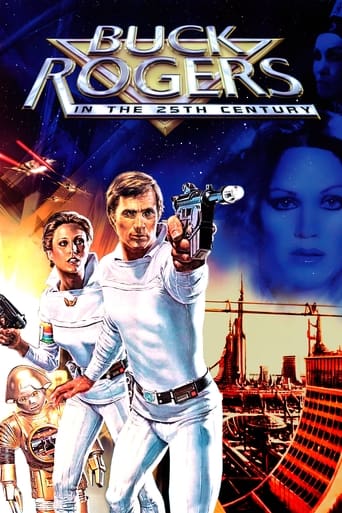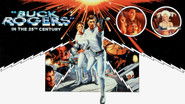jefffisher65-708-541158
I was always on the watch for science fiction in the 1970s, and thanks to the late, lamented Starlog magazine, it wasn't hard, really, to do so even in that "stone age" period. So, I was able to see the pilot film in its theatrical release, and was quite eager for the series to begin. I wasn't disappointed in the show as Gil Gerard made a fine Buck, Erin Gray a beautiful, sexy Wilma Deering, and Pamela Hensley as Princess Ardela was a dream come true for teenage guys in 1979, I can assure you. The episodes which featured Ardala always resulted in the most comments among the guys at school, not surprisingly! I've often wondered how NBC got by with the outfit(or lack there-of) which Ardala usually wore, as it wasn't much above being nude, really.The episodes of the first season can't compare to Star Trek by any means, but were fun adventures which had the good guys disposing of the bad on a regular basis. The show also featured numerous other beautiful women in quite revealing outfits(if of a disco-like nature), and few guys complained about this, either. I did find Twkii quite annoying at times, especially the way his voice was usually done, no fault of Mel Blanc's.The second season I found interesting as well if not quite as enjoyable as the first - I did like Thom Christopher's character Hawk. Feel he added a needed "male buddy" for Buck something like Kirk & Spock. Suspect the series would have found a firmer- footing had it ran longer, but NBC's track record with fantastic genre television has never been exactly first-class.One note many here don't seem to be aware of concerns the Star Gates used in the first season so often. In the mid-1970s, an author named Stephen Robinett, now deceased, wrote a novel called Stargate. It can be found in a hardback from St. Martin's, and some Ace paperback editions also. I read the magazine version, and the concepts are almost identical as best I can recall, although I don't believe there was ever any lawsuit over it. Quite possibly, Mr. Robinett was unaware of the use of the device in this show, although it could have simply been coincidental, of course.All in all, a good series fondly remembered, and recommended for any who are fans of 1970s-era science fiction
Ben Burgraff (cariart)
What do you do when you served as Executive Producer to one of the decade's most expensive failures, and you have all these leftover props, costumes, sets, and special effects film footage lying around? If you're Glen Larson, and the failed series was "Battlestar Galactica", you consider producing another Science Fiction-themed series, less pretentious and more 'audience-friendly', that can utilize all the surplus......and in a very real sense, that's how "Buck Rogers in the 25th Century" came to television, in 1979! Based, originally, on a 1928 short story, 'Buck Rogers' achieved his greatest fame in comic strips, radio, and a movie serial in the 1930s, but by 1979, the character had been 'retired' for 28 years, and Larson knew he could 'update' the story without arousing much controversy. The 'new' Buck was an astronaut piloting the last of Earth's 'Deep Space' probes, Ranger 3, in 1987(!), which was thrown off-course by a cosmic disturbance, and damaged, entering a centuries-long looping orbit back to Earth, and releasing a mix of gases that placed Rogers into suspended animation for 500 years. Revived by the evil Draconian Empire, Rogers soon is returned to an Earth in ruins after a nuclear holocaust, where he gradually earns the government's trust, and becomes a civilian 'troubleshooter', using his 20th century wiles to save Mankind, again and again.Casting was essential for the series to succeed, and Larson made an inspired choice in Gil Gerard, 36, as the lead. Ruggedly handsome, Gerard combined maturity with a boyish charm, and an ability to make even the most risqué remark seem unoffensive (and the series pilot, released theatrically, had a LOT of risqué remarks!) As Wilma Deering, a Colonel in Earth's Defense Force, Erin Gray, 29, was a bit wooden, but gloriously beautiful, and wholesomely sexy; Tim O'Connor, 52, as wise Dr. Huer, provided kind stability and statesman-like wisdom to the mix, and a goofy little robot, "Twiki", voiced by Mel Blanc, gave the kids something to enjoy (although he would utter an occasional risqué or ethnic aside, as well).The first season of "Buck Rogers", while certainly not 'Classic TV', offered an entertaining mix of adventure and comedy, with stories that intentionally avoided the 'heaviness' that plagued "Galactica". Rogers would face a variety of galactic terrorists, dictators, and madmen, fend off advances by a variety of scantily-clad women, and maintain a "Will they or Won't they?" relationship with Deering. High points were the guest appearances by Pamela Hensley as the evil but vampy Drackonian Princess Ardala, in huge head wear (and little else), and, in a wonderful cameo, the legendary Buster Crabbe, who'd played both "Buck Rogers" and "Flash Gordon" in the 1930s, as 'Brigadier Gordon'.While ratings were mediocre, at best, the series was renewed for a second season...and all the mistakes of "Galactica" were repeated, when the Earth-centered series was dropped, in favor of a starship-based, 'serious' adventure, as Buck and Wilma joined in a "Galactica"-like search for 'lost' tribes of humans who'd fled Earth at the time of the Holocaust. Why was the entire concept changed so abruptly, and disastrously? The reason I've been told, was that Gerard, a devout Christian, did not like the sexual undercurrent of the first season, and wanted stories that would be more uplifting and family-friendly, and that he forced the changes on a less-than-enthusiastic Glen Larson. Whether or not this was true, the season lacked all the swashbuckling joy of Season One, and despite an attempt to introduce a bird-like, stoic alien ('Hawk', portrayed by Thom Christopher), to attract the "Spock" crowd, the episodes were frequently dull and uninspired, and the ratings plummeted. When NBC canceled the series, just 13 episodes into Season Two, no one was truly surprised.While Gerard's post-"Buck Rogers" career was a roller-coaster ride of highs and lows, Erin Gray enjoyed a long, successful run on "Silver Spoons", and both actors, today, are popular Convention guests, as both "Buck Rogers" and Larson's "Battlestar Galactica" have achieved 'cult' status."Buck Rogers in the 25th Century" will never be held in the kind of esteem "Star Trek" or "Babylon 5" enjoy, but, as a rare chance to see how television viewed Science Fiction in the "Disco Decade", the series has earned it's own piece of immortality!













